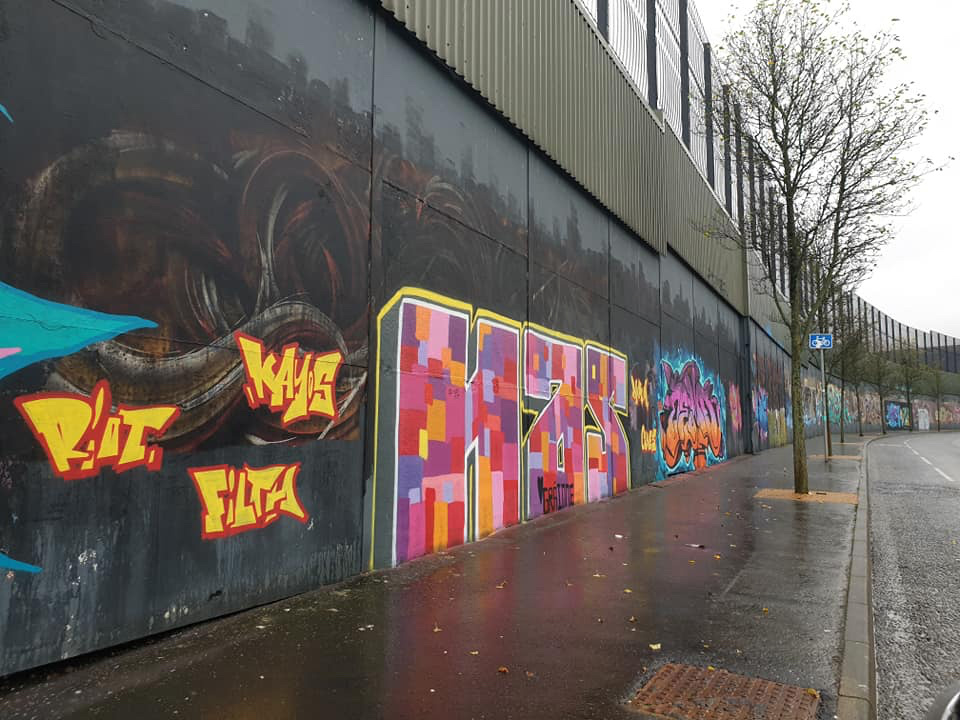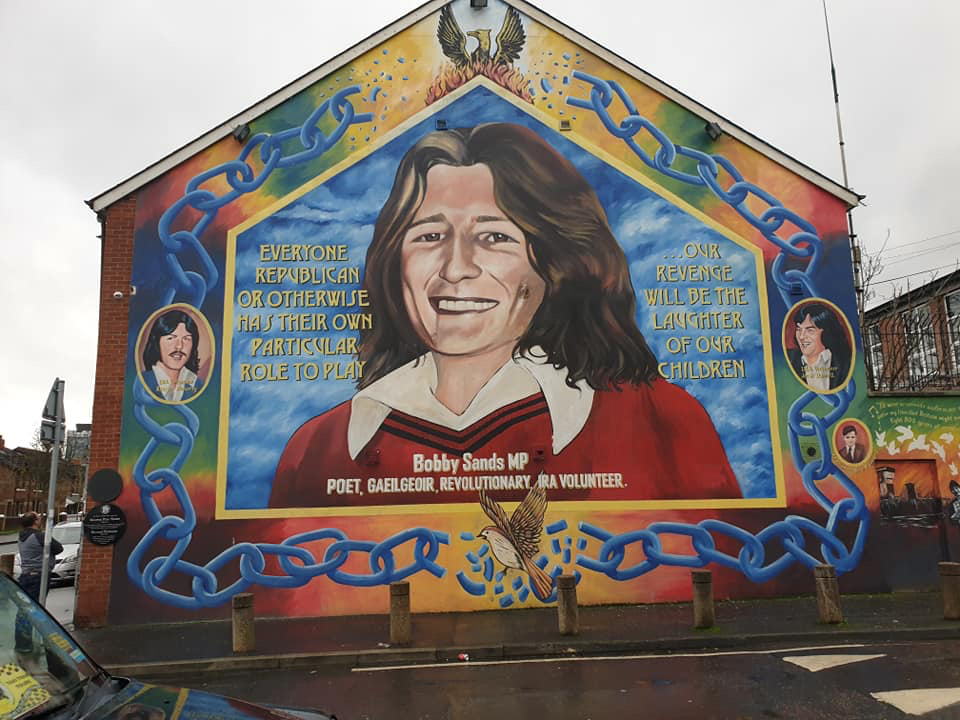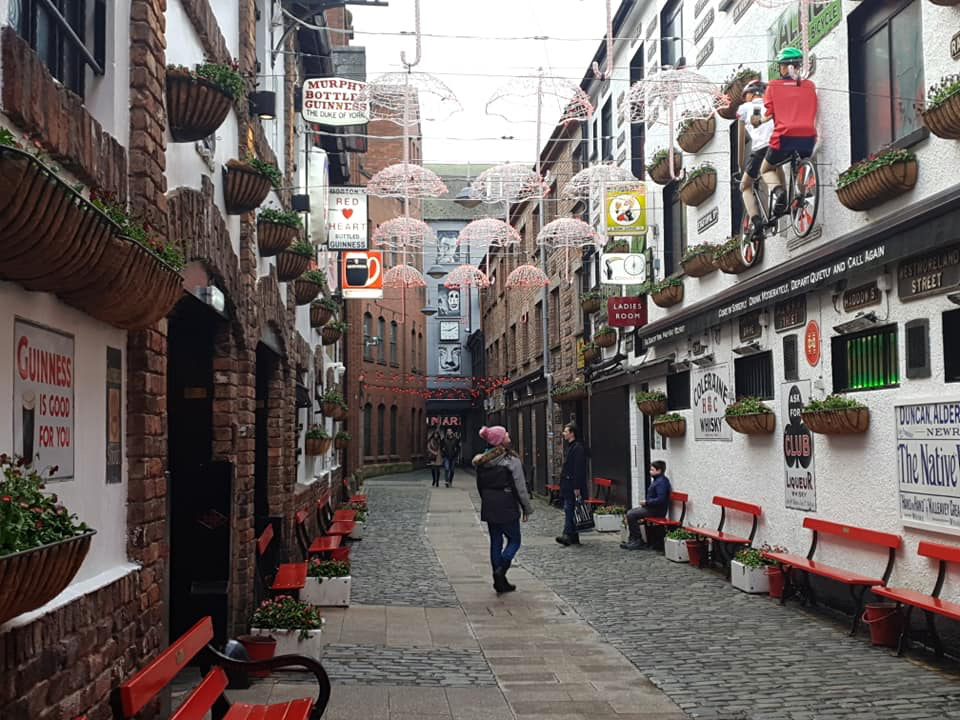
HEATHER KEITH, a writer with Baptist World Aid Australia, looks at what experience has taught her about praying and hoping for peace in our conflicted world…
Sydney, Australia
I remember the hot flush of indignation when my primary school classmates blithely assumed my family were terrorists. They knew my ethnic background, had seen the news, and put two and two together to get “kneecapping-gun-toting-terrorist”.
It was the 1980s. Northern Ireland was a hot spot where peace seemed unattainable. ‘The Troubles’ – the violent struggle between Catholic Nationalists and Protestant Loyalists that started in the 1960s – was merely the latest iteration of an 800-year-old struggle for Irish independence since the Anglo-Normans colonised the island in the 12th century.

A peace wall – a divider with gates that still get locked overnight to keep Protestant and Catholic communities separated – in Belfast in 2020. PICTURE: Heather Keith
In those 800 years, the Irish had collected significant reasons to object to English governance. Various unreasonable laws were enforced, repealed and re-enforced through the years including: outlawing Catholic clergy; limiting the professions of law and medicine to Protestants only; outlawing Irish music and language; and confiscating Catholic-owned land.
Land became a tool to lure Catholics to convert to Protestantism. Those who chose this option were seen as disloyal traitors, but it was the only way to hold onto their ancestral land and the livelihood it provided. Such conversions had little to do with faith in Jesus, and everything to do with oppression, control and power.
“Catholics, having hard-won the Republic’s liberty through wars and political agitation, found the very notion of a divided Ireland offensive. Protestants – then over half the residents in Northern Ireland – asserted their right to live peacefully as British citizens.”
And then came the famine.
The famine that wasn’t really a famine
Across Europe in the first half of the 19th century, potatoes were affected by a disease that made them impossible to grow. But it didn’t cause a famine anywhere else, just in Ireland.
The Irish depended upon potatoes as their main food source because it was a high calorie crop that could be grown in next to no land. And they had next to no land. By the time of the famine, after centuries of exploitation and religious persecution, most Irish Catholics lived in abject poverty, renting small plots on vast estates owned by English landlords. These absentee landlords had armed guards shepherd Irish grown oats, corn, meat, fish, and vegetables to England while the Irish starved or emigrated in astonishing numbers.*
A gift from God to Protestant England?
England, the wealthiest country in the world at the time, made some effort to help with supplementary food and workhouses, but it was transparently half-hearted. Trevelyan, Britain’s treasurer, called the famine ‘a direct stroke of an all-wise and all-merciful Providence.’ He further expressed hopes that the famine would inspire what he regarded as the ‘selfish, perverse and turbulent’ Irish to become more industrious and less of a burden on Britain.
Shortly after this, Trevelyan deferred responsibility for the starving people upon their landlords which led to a 1,000% increase in evictions. Trevelyan became one of the most loathed figures in Irish history, and the bitterness the Irish already felt towards England set like cement.
Many historians regard this period as one of genocide as much as famine. Certainly, many deaths could have been avoided if the Irish had been allowed to eat the food grown in their own country. The famine, the victims it claimed, and the injustice of it all is remembered to each new generation in songs, poems and stories. My father used to sing me to sleep with these songs in the 80s.
With so much reason for hate, how did they find peace?
It wasn’t easy. Catholics, having hard-won the Republic’s liberty through wars and political agitation, found the very notion of a divided Ireland offensive. Protestants – then over half the residents in Northern Ireland – asserted their right to live peacefully as British citizens.
As each side fought what they considered a righteous war, 3,600 people died in bloody sectarian violence. Then in the 1980s and 90s, politicians from both sides agreed to participate in ‘the Peace Process’ – a movement aimed towards shared power and disarmament.
At first it was difficult, and with little goodwill on either side ceasefires were made and broken over and over. There were kidnappings, bombings, political prisoners, hunger strikes and little reason to believe anything would, or could, come from the Process. My Belfast-born Modern History teacher laughed when I asked in 1996 if the Peace Process had a chance of success, ‘of course not,’ he said. ‘At least not any time soon.’
But others remained hopeful.
In her 1994 song, Famine, Sinead O’Connor identified the famine as a key part of Ireland’s ongoing struggle for peace, but she also saw a way forward:
I see the Irish
As a race like a child
That got itself bashed in the face
And if there ever is gonna be healing
There has to be remembering
And then grieving
So that there then can be forgiving
There has to be knowledge and understanding

A memorial to Bobby Sands – a politician who died in 1981 during a hunger strike protesting the jailing of Catholic political prisoners and who became a martyr for the Republican cause – in Belfast, Northern Ireland in 2020. PICTURE: Heather Keith
The power of imperfect peace
In April 1997, Ireland – north and south, Catholic and Protestant – took an extraordinary step.
Together, they voted for a new path. The Good Friday Agreement – aka the Belfast Agreement – was a complicated treaty that paved the way forward for governing Northern Ireland in partnership and in peace. It wasn’t a victory for either side, but a true compromise, and the violence didn’t end overnight, but things did start to change.
Two months later at a 150-year remembrance of the potato famine, for the first time ever an English Prime Minister – Tony Blair – acknowledged that Britain had acted wrongly during the famine.
‘Those who governed in London at the time failed their people through standing by while a crop failure turned into a massive human tragedy…That one million people should have died in what was then part of the richest and most powerful nation in the world is something that still causes pain as we reflect on it today.’
It wasn’t a fulsome apology, it was long overdue, and it came from Tony Blair rather than the British government. But it was still well received by the people of Ireland and helped heal the rift.
We rely on our readers to fund Sight's work - become a financial supporter today!
For more information, head to our Subscriber's page.
Small faltering steps and the offering, and accepting, of imperfect acts of peace meant Northern Ireland’s violence eased. Belfast became known for its Titanic Museum and as the location where Game of Thrones was filmed instead of bombings and kidnappings.
But there was still the matter of the IRA’s massive stockpile of weapons, funded by Republicans both in Ireland and by the Irish diaspora around the globe.
That changed in the wake of 9/11. It was the final push the IRA and their international supporters needed to want peace more than the sense of security those weapons offered. Six weeks after the attacks in US, the IRA started decommissioning their weapons and, in 2005, the IRA formally ended its campaign.
All this is to say there can be peace even when it comes after hundreds of years of rage, and where peace has failed before.

Heather Keith’s children in Belfast, Northern Ireland in 2020. PICTURE: Heather Keith
As Christians, we follow the Prince of Peace and are called to keep hoping, praying and acting for good in situations that seem unsalvageable – because the one who restores all things works through us and he can do it.
‘Now to him who is able to do immeasurably more than all we ask or imagine, according to his power that is at work within us, to him be glory in the church and in Christ Jesus throughout all generations, for ever and ever! Amen.’ (Ephesians 3:21)
God was at work in the hearts and minds of those who kept working for peace in Ireland, despite the difficulties. He was at work in those who reached out with apology and those who forgave. He is at work in us when we do the difficult but healing work of painful truth-telling, and he works through those who are responding without defensiveness.
My 19-year-old son received his own Irish citizenship recently – his grandfather has given him the gift of easy travel and working rights around Europe and the UK. He joins a generation of Irishmen and women who are telling the stories, singing the songs, and calling out the injustice of past, without letting go of peace.
* Ireland’s population was around eight million in 1841. It is estimated that around one million people died of hunger or disease and two million emigrated. People continued to emigrate from Ireland in vast numbers after the famine and the population dropped to around three million in 1961. Today Ireland’s population it is around five million.
Heather Keith is a writer for Baptist World Aid Australia and is grateful for the opportunity to share stories of hope in a world that desperately needs it. She wrangles life with her husband Simon, three incredible teenagers, and too many cats.







One Response
Beautiful recount of the history that resulted in such a tortured period of violence – with such an unexpected outcome. And rightly explained because Christians and some not so, behaved as followers of Jesus when all seemed impossible. We could use some of the same for Ukraine (think Alexei Navalny and the outcome of his sacrifice has yet to be experienced). And for Gaza/Israel.